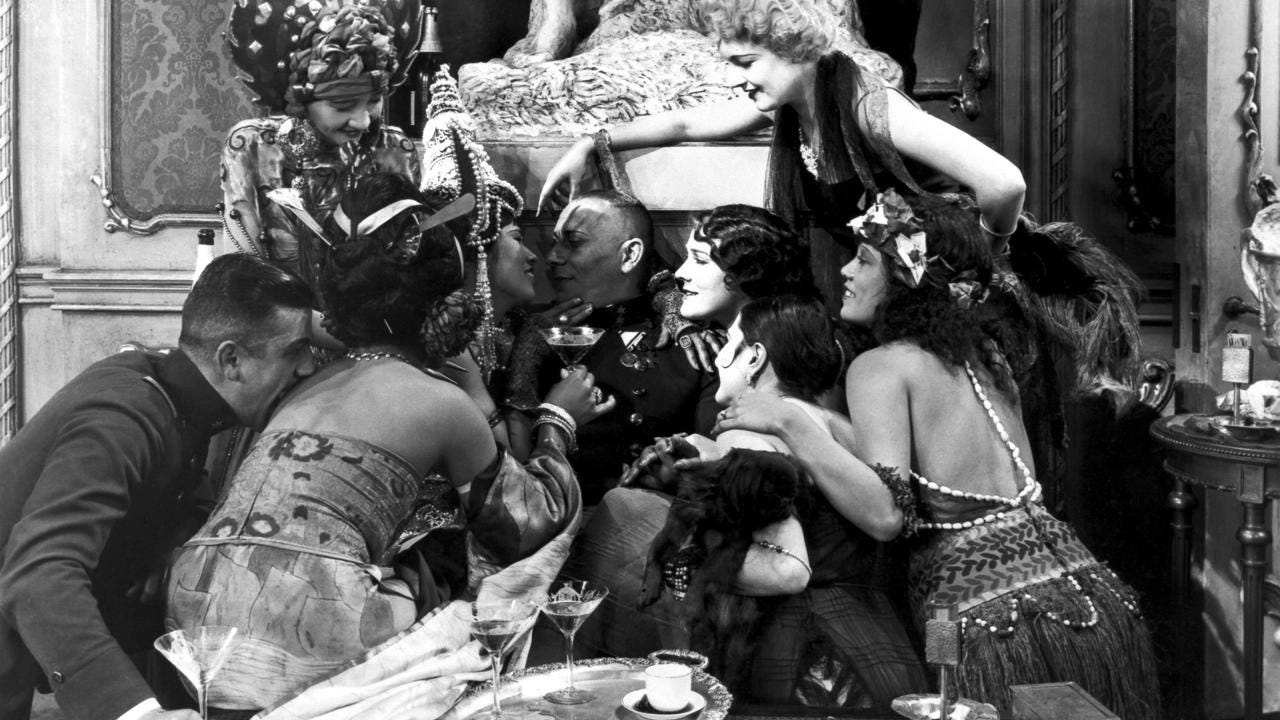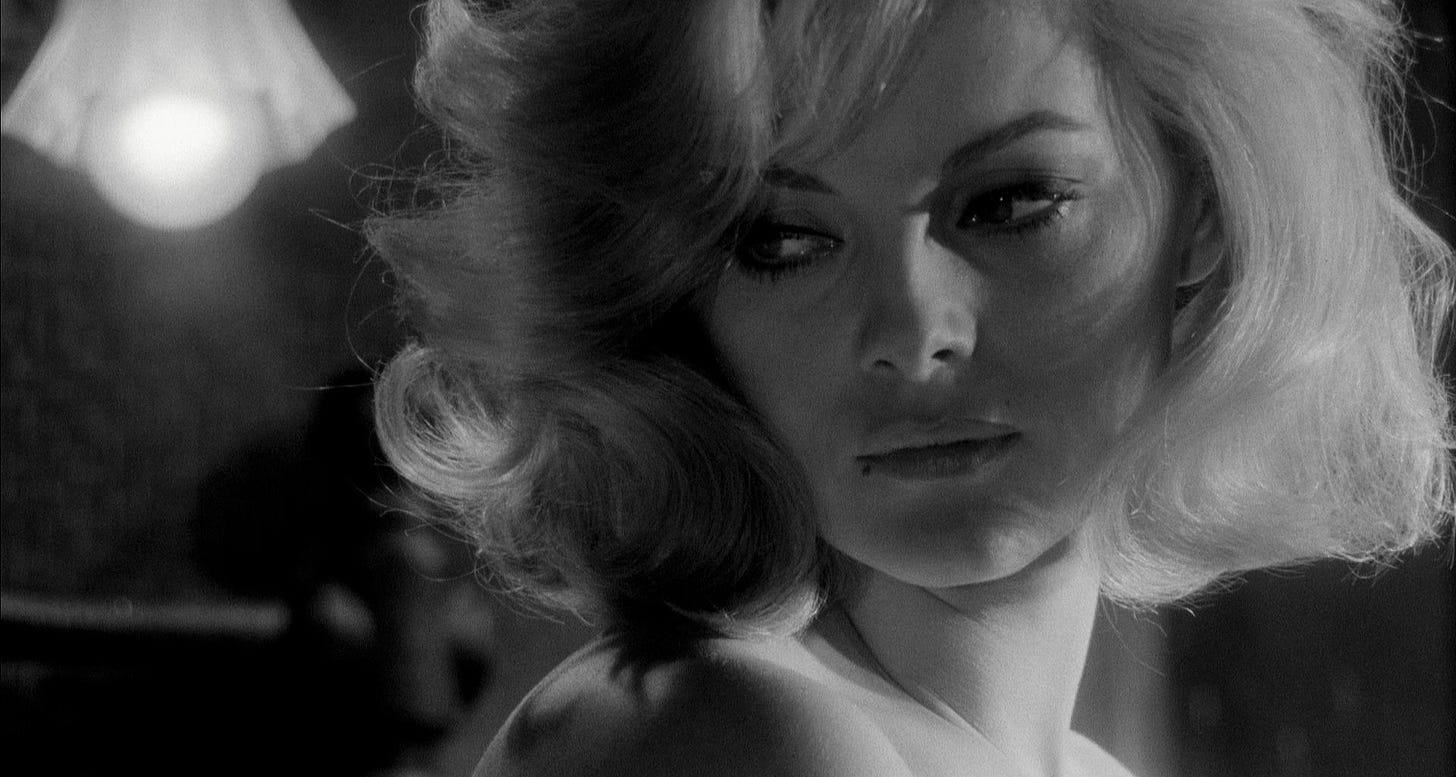Electric Trio Vol. 7
'The Wedding March' (1928), 'The Possessed' (1965), and 'Motorway' (2012)
Electric Trio is a column where I look at some of cinema history’s countless underseen, underappreciated, and largely forgotten works. The format (or gimmick, if you prefer) is simple: three films, three paragraphs each. Hopefully these posts will, on occasion, move a few of my readers to seek out a film they were previously unfamiliar with. If not, I hope that reading about them proves a worthwhile experience, at least.
The Wedding March (1928)
1924’s Greed is and will likely remain Erich von Stroheim’s most revered directorial work but to fully appreciate his contributions to the artform, which was still in its infancy during his prime (and in the scheme of things, might still be, about a century later), it’s useful to look at how his complicated relationship to cinematic images — Alex and I further discuss the often worrisome nature of the Image here — found its expression four years later with The Wedding March, one of the most extraordinary silent films ever made.
Set in Vienna in 1914, von Stroheim plays Prince Nickolas von Wildeliebe-Rauffenburg (referred to as “Nicki”), a wonderfully Stroheimian character, all tragic, uniformed repression, who, in a bid to save his noble family from their dire financial straits, agrees to marry Cecelia Schweisser (ZaSu Pitts), the daughter of a wealthy factory owner. Problem is, Nicki is actually in love with Mitzi (Fay Wray), the beautiful daughter of an innkeeper who is herself already engaged to a crude butcher named Schani (Matthew Betz).
The Wedding March is a film against itself, serving up lush, beautifully composed images while simultaneously saturating them with venom, letting bitterness and cynicism seep in to expose the sinister dreams that undergird them. The great care put into crafting these images appears to be at odds with how they serve to ruthlessly attack romanticism and cinematic spectacle more broadly — the wedding sequence is all the more heartbreaking for its aristocratic extravagance, transforming Richard Wagner’s “Treulich geführt” into a death knell — but without it, Stroheim’s picture, which was followed by a now-lost sequel entitled The Honeymoon, wouldn’t be the sensuous, painful modernist tragedy it is.
The Possessed (1965)
Somewhere between “weird-menace” giallo and mazy film noir sits Luigi Bazzoni and Franco Rossellini’s 1965 mystery film, The Possessed. The contours of the plot resemble the latter but the film’s form, aesthetics, and editing — shots of blinding white light reflected off razor blades, loose narrativity, and intense closeups all find their way into its economical 85 minutes — feel very much at home with the former. There is an element of Hitchcockian voyeurism at play as well, something which imbues even the artsier affectations with a shot of luridness.
Michelangelo Antonioni’s work undoubtedly carried over into the film’s DNA but the story specifics — a writer, Bernard (Peter Baldwin), returns to a small Italian village in hopes of reconnecting with Tilde (Virna Lisi), whom he harbored a crush on, but instead becomes embroiled in an investigation into her alleged suicide the year prior — add a degree of interest to this comparison: it predates Blow-Up, Antonioni’s famous English-language thriller, by more than a year. (In spite of Blow-Up’s renown, The Possessed is the superior film.) But really, genre-leaning score and pulp voiceover aside, Bazzoni and Rossellini’s — for those wondering, the latter is the nephew of director Roberto Rossellini — work resembles the moody La Notte (1961) far more.
The Possessed is at its strongest whenever it dips into disorienting subjectivity — the film flows freely between dreams, memories, premonitions, day and night, even life and death. The resulting queasiness — the filmmakers sometimes approach Bergman-esque heights and it’s easy to imagine David Lynch being inspired by how its surrealism winds around the noir mechanics — doesn’t truly find release even after the mystery is solved. Too many questions linger and that last bit of unknowability lurks: a terrible, uncomfortable unknowability about the human condition that is so rarely explored in contemporary cinema but looms large over Bazzoni and Rossellini’s gripping, enigmatic picture.
Motorway (2012)
One word that springs to mind when considering Soi Cheang’s 2012 action thriller Motorway is “purity.” In terms of action filmmaking, Cheang’s car chase spectacular is about as pure as it gets: barebones plot, utilitarian characterization, and, of course, a lot of male pain and anguish. Johnnie To protégé Cheang regularly invites a lot of comparisons to his mentor but while there is certainly some overlap with how the two render wounded and weary masculinity, the hyper-digital textures and nocturnal moodiness suggest something more akin to 21st-century Michael Mann, particularly Collateral (2004) and Blackhat (2015).
It’s a beautiful convergence that also sheds some light on where the nuclear blast that was Cheang’s Limbo (2021) came from: the director’s early impulses are decidedly gonzo, on both a narrative — Cheung’s (Shawn Yue) central obstacle is not knowing how to maneuver around tight 90° corners the way the film’s villains can — and a formal level. It’s this sensibility that his 2021 action thriller fuses with what could be considered more well-rounded (or at least higher-budgeted) filmmaking while still retaining some of that gonzo pulp edge, seen in its out-there stylistic flourishes as well as a subplot concerning Will Yam’s (Mason Lee) aching wisdom tooth.
The Handover of Hong Kong in 1997 had a profound effect on its cinema, its action cinema in particular, and the anarchic and often criminally reckless energy of the pre-Handover film industry — remember the scene in Fatal Termination (1990) where a five-year-old girl is held out the window of a speeding car by her hair? — made way for something that, at first glance, appears more subdued (or at least more in line with contemporary workplace safety guidelines). But if nothing else, Motorway illustrates the filmic possibilities of this new era while still bringing much of the same physicality that made its forebears so madly captivating to its pared-down cops-and-robbers actioning.







The Possessed seems right up my alley. I don't think I've even heard of it! Doing the Lord's work as always.